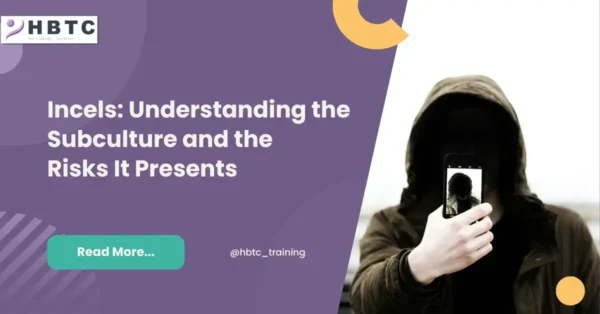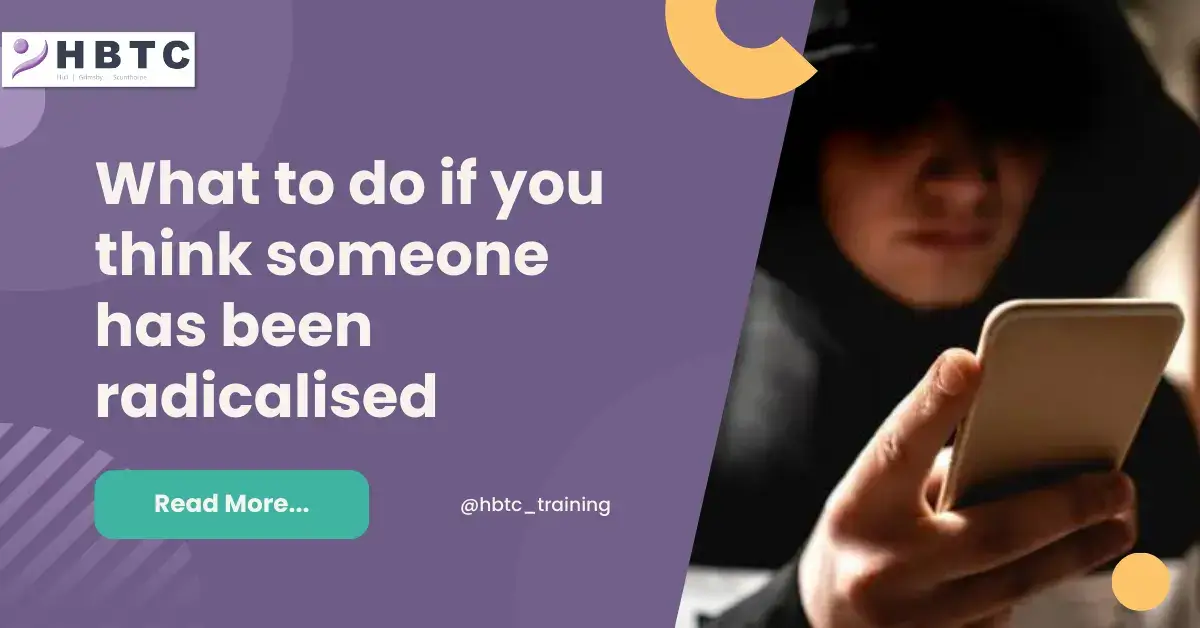Incels: Understanding the Subculture and the Risks It Presents
In recent years, the term “Incel” has increasingly appeared in internet forums and news headlines, often associated with troubling stories of online extremism and sometimes even violence. While this is a sensitive subject, it cannot be ignored. At HBTC, we believe the best way to tackle this is through awareness. In this article, we will break down the term “Incel”, explain the dangers, and share how to take action if needed.

What does Incel mean?
The term “incel” is short for involuntary celibate and describes someone (typically male) who feels unable to form sexual or romantic relationships despite wanting them. While some use it simply to express frustration with dating, the word has increasingly been associated with online communities that promote misogynistic and, in some cases, extremist views.
The Wirral Safeguarding Children Partnership defines incels as “exclusively male online spaces characterised by white male supremacy, the oppression of women and the glorification of male violence.” Over time, this frustration can manifest in ways that are harmful not just to others, but to the incels themselves, fuelling cycles of anger, self-loathing, and, in extreme cases, violence.
How did the Incel Subculture Begin?
Coined by a lady named Alana in the 1990s, the term “incel” was formed as part of an online support forum for people struggling with loneliness and dating difficulties. Initially, it was meant to foster empathy and understanding. However, as the term spread across different internet spaces, it evolved into something much darker.
Today, online forums that identify with incel culture often promote hostility towards women, resentment towards men seen as more attractive, also known as “Chads”, and fatalistic beliefs about dating and relationships. These communities have developed their own slang, memes, and ideological frameworks, often borrowing from conspiracy theory culture.
The dangers of incel ideology – terms to look out for
The incel subculture is complex, but its risks are very real. Central to incel communities are ideological frameworks built around terms like “red pill,” “blue pill,” and “black pill.” These metaphors describe stages of belief and acceptance within the group:
- The “blue pill” symbolises remaining unaware or ignoring the harsh realities incels believe they face.
- The “red pill” represents a supposed awakening to the “truth” that women have unfair advantages and that society oppresses men, especially incels.
- The “black pill” reflects a fatalistic acceptance that nothing can change, leading to feelings of hopelessness and despair.
While these may sound like internet slang, they signify deeply ingrained worldviews that can radicalise vulnerable individuals. Those who adopt the “red pill” mindset might become hostile towards women and society, sometimes escalating to violence. Meanwhile, those who follow the “black pill” ideology may struggle with severe depression, self-harm, or suicidal ideation.
Incels also use mockery like “Chad” (an idealised attractive male), “Stacey” (his female counterpart), “Becky” (an average woman whom incels feel entitled to), and “Normie” (someone who has an average social life). These stereotypes often deepen feelings of resentment, entitlement, and alienation, reinforcing misogynistic and sometimes extremist narratives.
Why is this a risk?
While the majority of people identifying as incel do not commit violent acts, there have been notable cases where individuals inspired by incel ideology have carried out attacks. These include the 2014 Isla Vista killings in California and the 2018 Toronto van attack, both of which were executed by male attackers who committed such horrific crimes due to their hatred of women. Such incidents highlight the potential for online resentment to spill into real-world harm.
Beyond public safety concerns, research shows that incels themselves often experience severe mental health struggles. Studies have found disproportionately high rates of depression, anxiety, suicidal thoughts, and extreme loneliness among self-identified incels. Some research also notes a higher prevalence of autistic traits within the community, which can compound difficulties in forming social relationships.
Taking action – prevention and support
- Spot the Signs Early
Look for social withdrawal, obsessive engagement with misogynistic content, hopelessness about relationships, or talk of “taking the red or black pill.” These can be warning signals of someone being drawn into harmful ideologies. - Create Safe Spaces for Conversation
Many young men find it hard to talk about loneliness or rejection without judgment. Encouraging honest, open dialogue in schools, homes, and communities can reduce isolation and counter harmful narratives. - Promote Mental Health Support
Early intervention through counselling, peer groups, and education about emotional well-being can address underlying issues like low self-esteem or social anxiety, helping individuals find healthier ways to cope. - Teach Critical Digital Literacy
Helping young people critically evaluate online content can reduce their vulnerability to radicalisation. Educate them to recognise extremist rhetoric and disengage before it takes root. - Encourage Positive Communities
Offering alternative, inclusive spaces—whether in-person clubs, online groups, or social programmes can fulfil the human need for belonging that incel forums exploit. - Follow Safeguarding Protocols and Report Concerns
If you suspect someone is at risk of radicalisation or harm linked to incel ideology, act swiftly. Follow your organisation’s safeguarding procedures, consult designated safeguarding leads (DSLs), and consider referrals to programmes like Prevent.
In emergencies or for immediate concerns, contact emergency services by calling 999. For non-emergencies, you can reach local police on 101 or report extremism-related concerns via official channels such as:
- Email: info@counteringextremism.gov.uk
- Online: National Prevent referral form
For the Prevention of Extremism in Education:
- Phone: 020 7340 7264 (Monday–Friday, 11am–3pm)
- Email: counter.extremism@education.gov.uk
conclusion
Understanding the incel subculture is essential not to stigmatise vulnerable individuals but to recognise when loneliness and frustration become fuel for dangerous ideologies. Through early identification, open support, mental health care, and education, we can reduce the harm this subculture can cause, both to those involved and society at large. True prevention happens when communities unite to build connection, empathy, and hope, ensuring no one feels their only option is to turn to hate.
You may also be interested in…

Emily Simpson
Emily is our Digital Marketing/Learner Engagement Apprentice and is involved with all things social media and content development. She is also responsible for attending career events and maintaining relationships with local schools and colleges.


